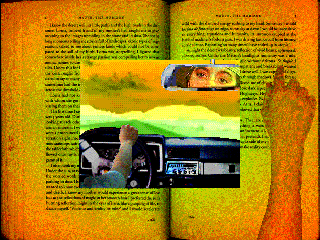 |
| From Mauve Desert: A CD-ROM Translation by Adriene Jenik. Published by Shifting Horizons Productions. Reproduced by permission. |
In a series of connected screens in Korean-Canadian Jin-Me Yoon's bilingual hypertext Imagining Communities (bojagi), she speaks of:
mother
mothertongue and
other tongues
Perhaps online spaces allow us as Canadians--and as women--the freedom to translate ourselves and to speak in our own voices precisely because it encourages us to be multi-tongued, it allows contradictions, it allows us to double back on our paths and to restate our meaning. This kind of speaking creates clarity in the same instant that it embraces a swarm of subjectivities. Like a prism's innate ability to fracture light, this illumination is inherently schizophrenic. The fluidity of an online environment's spatial nature allows all its denizens the (potential) power to speak multi-dimensionally. At the same time, it is what Deleuze and Guattari might call 'deterritorialized' space, space not at home in a motherland, and 'deterritorialized' speaking, speech not at home in a single mothertongue (as opposed to the book, which Moulthrop says, "territorializes" writing (1991, 154)). Electronic environments trouble the waters of alleged unity (in notions of identity, nation, race, philosophy, feminism, etc.) and make explicit the gaps, the aporia, the ruptures of our thoughts, our words and our interactions with the world. Electronic culture is quintessentially postmodern and material, constantly being in the process of enacting, revealing and critiquing its own theoretical foundations--much as feminism does.
In her book Nomadic Subjects, Rosi Braidotti speaks of female identity as a matrix of interconnected points based not on fixity but on contingency. For her, the postmodern feminist consciousness is rooted in mobility, and mobility of all kinds: moving across linguistic and national boundaries, moving out of traditional roles, becoming interdisciplinary, becoming deterritorialized. At the same time, Braidotti does not see nomadic subjectivity as aimless drifting, but as being sympathetic to Donna Haraway's "situated knowledges." Braidotti states:
By all means, we should be nomads. We only broaden our honeycomb perspective when we maintain our awareness of edges. Boundaries should only be present as long as they are open and permeable and there is always room for more cartographers of the constantly changing. Interactive and network cultures are more means of circulating than they are ways of staking a claim. Canadian, feminist and online cultures are rooted in spatio-temporal flux. We translate ourselves to speak in many voices and many genders, many spaces and many times as a means of re-embodying ourselves, clothing ourselves in the gaps of language.As Haraway rightly puts it: you must be located somewhere in order to make statements of general value. Nomadism, therefore, is not fluidity without borders but rather an acute awareness of the nonfixity of boundaries. It is the intense desire to go on trespassing, transgressing. As a figuration of contemporary subjectivity, therefore, the nomad is a postmetaphysical, intensive, multiple entity, functioning in a net of interconnections. S/he cannot be reduced to a linear, teleological form of subjectivity but is rather the site of multiple connections. ...s/he is complex, endowed with multiple capabilities for interconnectedness (35).
Canadians are fascinated by translation and media translation is an art form unto itself. It involves a revisioning of an original into another form--not simply a different language, but a different way of seeing. The creation of a new, interactive intertext involves the visualization of a different potential reality that is inherently collaborative. It calls for six degrees of freedom in looking between words, ideas and objects. Mallarmé said that the job of poetry was to clean up our word-congested reality by creating silences around things. True silence and space can only be dialectical. John Cage too was obsessed by the possibility of the existence of nothing, by an occupied silence. This notion embodies the ésprit of a community: wholly present but rarely seen, only felt as an omnipresent hum.
Selected Canadian Online and Electronic Projects:
Orlando Project: An Integrated History of Women's Writing. University of Alberta.
Canadian Women's Studies Online. University of Toronto.
Coach House Online Editions.
Consortium for Computing in the Humanities (COCH/COSH)
The Electronic Labyrinth Home Page or mirror site by Chris Keep, Tim McLaughlin and robin.
>>iceflow>>a show of Canadian Web Specific Art.
Maid in Cyberspace: le festival de XX d'art WWW. Installation of Women's Web Art.
Web Artworks by Canadian Women.
Canadian Feminist Hypertexts:
Carpenter, Jessica R. Jennifer.
Frenkel, Vera. The Body Missing...(and the Transit Bar Might be Anywhere).
Jenik, Adriene. Mauve Desert: A CD-ROM Translation of Nicole Brossard's novel. Los Angeles: Shifting Horizon Productions, 1997. (Brossard is Canadian, but Jenik is not.)
Lazariuk, Leah. Virtual Squat.
Mac, Kathy. Unnatural Habitats. Eastgate Quarterly Review of Hypertext 1 (3). Cambridge, MA: Eastgate Systems, 1994. Software.
McGovern, Catherine. the girl with the sword is mute. A web fairy tale in two chapters.
Monro, Kate. Cyberporn Gallery.
Mueller, Petra. Update on the Future.
The Love Money and Weather Project.
Necakov, Lillian. Polaroids. Coach House Online Editions, 1997.
Rivera, Raquel and Jeannette Lambert. emerging from erasure.
mining reflections. Collaborative hypertexts.
Seaman, Patricia. New Motor Queen City. Coach House Online Editions, 1997-1998.
Sourkes, Cheryl. Genes and Genesis. Visual artist.
Thorne, Kika. Girl Gang.
Tremblay, Elene. Chagrins.
Trudel, Pascale. Amazone. Visual Artist.
Yoon, Jin-Me. imagining communities (bojagi). Visual artist.

Carolyn Guertin